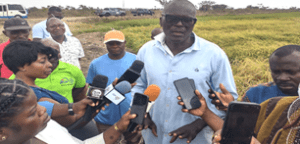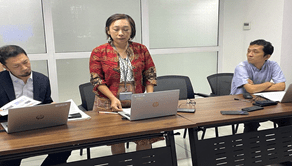By Kizito CUDJOE
Chief Representative-Japan International Cooperation Agency (JICA) in Ghana, Momoko Suzuki, has emphasised the importance of implementing the country’s national rice development strategy while ensuring policy coherence to enhance rice production.
Ghana faces a significant gap between rice consumption and production, relying heavily on imports to meet its food security needs.
Rice, a major staple, was ranked the 5th most imported food product in 2023. In the same year, Ghana is reported to have imported about US$342million worth of rice – becoming the commodity’s 29th-largest importer in the world, primarily from Vietnam, India, Thailand, China and Pakistan.
Notwithstanding the growing rice import bill, local production of the commodity has significantly improved with the support of technical assistance among others from development agencies such as JICA.
Momoko Suzuki noted that the government of Japan has been supporting rice production in Africa for quite some time, of which Ghana has been a beneficiary.
“In May 2008 – on the occasion of the Tokyo International Conference for African Development (TICAD) IV, JICA – in partnership with Alliance for a Green Revolution in Africa (AGRA) we launched the ‘Coalition for African Rice Development (CARD)’ initiative.
The aim of CARD was to double African rice production from 14 million tonnes to 28 million tonnes within ten years, which was met in 2018. On the back of this, in 2019 at TICAD 7, CARD 2 was launched to again double the production to 56 million tonnes by 2030.
“Ghana has been one of the beneficiary countries for CARD since the beginning,” she stated.
She said: “Through the Ghana Rice Production Improvement Project (GRIP), we are supporting the launch and implementation of the National Rice Development Strategy 2 to increase domestic rice production and ensure a stable supply, addressing urgent challenges in food security and foreign exchange retention for the Ghanaian government”.
It is to realise this objective that Momoko Suzuki, who was speaking at an interview in Accra during a press briefing on projects being undertaken by the agency in the country, stressed the need for policy coherence among others.
She maintained that this project will also contribute to the ‘Feed Ghana Programme’ to be launched by the current government.
During a media tour of several project sites supported by JICA, Mr. Solomon Buernor, Secretary-Seed Growers Cooperative Association and a rice farmer, commended the agency for its continued support over the years. The tour included the Kpong Irrigation Scheme (KIS) at Akuse, located in the Lower Manya Krobo district of Eastern Region.
He said, for instance, the KIS – which is one of the largest schemes in the country – had assistance from the Ministry of Food and Agriculture (MoFA) around 1999 in training rice-seed growers. However, he said, the support from MoFA waned, which led to a decline in seed production.
But he added that JICA has since stepped in – from 2017 to date – providing various forms of support which have significantly helped improve seed production yields backed by strong agronomic practices.
“The yield per hectare is 5 tonnes from nine farmers who are producing seeds for the scheme. We produce two times a year. This makes an average 180 metric tonnes of rice seeds for rice farmers in the country annually,” he stated.
He maintained that local production could be significantly enhanced if government commits to addressing the challenges of rice farmers, such as the provision of modern equipment as well as access to capital.
Mr. Samuel Evans Lamptey, Scheme Manager-Kpong Irrigation Scheme, explained that the project stretches from Akuse through Asutsuare to Kasunya. It supports a total 3,000 farmers working on 2,065 hectares of land dedicated to rice cultivation.
He noted the importance of seed production in rice farming, saying: “If you don’t have good seeds, your production will be flawed – especially in terms of produce quality. That is why we have these seed growers who have been receiving expert training through JICA”.
Mr. Lamptey argued that the provision of inputs and machinery, among others, will boost the rice farmers’ productivity. He maintained that the supply of transplanters, for instance, would significantly reduce production costs and, to a large extent, the financial burden of farmers.










